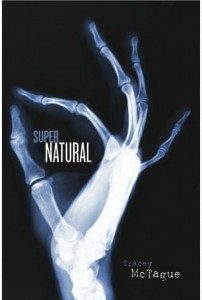 by Tracey McTague
by Tracey McTague
$15.00 | January 2013
US Domestic Shipping Only
Kindle Book Available for only $5.99
“A hornbook for the fledgling seer. A trickster’s bible. Mystic, domestic, ritualistic, caustic. Tracey McTague’s book invokes the spaces between the worlds with poems that demand to be read aloud, incantations against—or for—those liminal places where spirits flap free. With sensual vulgarity and profane beauty, her poems draw close to the divine, stripping language down to its glowing bones. I know this place; it stalks me. And I believe in these poems”
-Lauren Ireland
Tracey McTague is a “sorceress in sweet depravity/ & general decay.” She calls forth a world crowded with the debris of daily life, lit by “the wide-eyed radiance” of the poet’s mind: Antigone brand condoms and H.R. department emoticons.These poems brim with wonder, but also warning. They gather global gods and folk rituals, as if the present, or, more precisely, the future, required the resurrection of every possible power — hope here residing not above us but in the ways such prayers access “the primordial wisdom in the world as it is.”
-Allison Cobb, author of Green-Wood
Tracey McTague is a streetwise detective of the most unusual details; some of her poems read like a pile of stuff discovered in an alley — mysterious, then interesting, then meaningful, beautiful, and rewarding to the careful eye. Other poems seem channeled from the distant flare of a blinking star; on top of her Brooklyn hill, McTague is a strangely-alloyed antennae picking up eons-old cosmic messages. My favorite poems are the ones that demand to be reread. As soon as I finished this book, I started it anew.
-Shafer Hall, author of Never Cry Wolf
Tracey McTague’s amazing collection of poetry Supernatural, fires up the language. Folklore, nature, and the quotidian meld into bars of gold and silver. These poems dedicated to family and friends, lift off the page and light up poetry’s sky. Grounded in folklore, McTague’s poems can’t be nailed to the wall, they are tricksters, shape shifters that defy our expectations and rules.
-Brenda Coultas, author of The Marvelous Bones of Time
Delivered with the spontaneous mind of “first thought best thought,” each word is also a well wrought amulet stowed in vigrx plus buy in guelph the shelves of the poem. It’s their sense of strangeness, vast associative possibility and sonic kinkiness that makes me feel we can use them as chants to combat commonplace wrong-doers. As she writes, “bird-herald appears/making a joyful noise/& always pays your debts.”
-Stacy Szymaszek, author of Hyperglossia
Edgar Allen Poe famously wrote, “There is no exquisite beauty… without some strangeness in the proportion.” Indeed, stare for too long at any gorgeous flower and one begins to be stunned by its essential grotesquerie, which then in some mysterious way doubles back to make the blossom more beautiful still. Similarly, Tracey McTague’s poems tinker with the proportion of beauty to strangeness, finding just the right balance, as a Thai chef might with sweetness, acidity, salt, and spiciness. It just so happens that Tracey has one of the most beautiful gardens in Brooklyn…I’m not sure whether she has transferred the skill set of gardening into poetry or vice versa, or whether the dynamic is simply more complementary, but the poems are like enchanted terrariums, tiny organic assemblages in the “syntax of [an] unknown tongue. The lines are short and this economy helps us not to lose such exquisite, sound-attentive moments as “prank mask feasts,” “double bloom Twombly,’ “porch minks,” and “faux pas paw prints.” I almost want to call these “euphoria infested” poems gemlike, with their strange and unembarrassed (i.e. uncontested) beauty, but perhaps it is more accurate to compare them to amber. With her fine and surreal sense of juxtaposition and arrangement, Tracey is sure to work in insects and delicate mischief among the loveliness: there is a “nymph detainment center”, a “chocolate mingle turn-ons at herpes camp” and even a “Cartesian spider monkey [that] yells, ‘Titans – show us your tits’”! To which one can only respond: Tracey! Show us your poems!”
-Nada Gordon, author of Scented Rushes
About the Author
 Tracey McTague lives up on Battle Hill in Brooklyn, down the street from where she was born and across the room from where her daughter was born. She is the ornithologist consigliere for Lungfull! Magazine by day. By night, she is a root doctor, alchemist and hunter-gatherer.
Tracey McTague lives up on Battle Hill in Brooklyn, down the street from where she was born and across the room from where her daughter was born. She is the ornithologist consigliere for Lungfull! Magazine by day. By night, she is a root doctor, alchemist and hunter-gatherer.
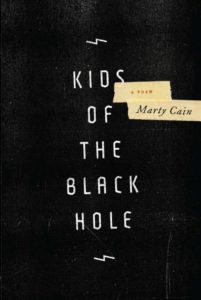
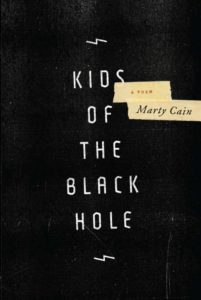 by Marty Cain
by Marty Cain Marty Cain was raised in Marlboro, Vermont, and holds a BA from Hamilton College and an MFA from the University of Mississippi. Presently, he resides in Ithaca, New York, with his partner, the poet Kina Viola; together, they run Garden-Door Press. Cain’s poems appear in Fence, Action Yes, Gigantic Sequins, The Pinch, Dreginald, and elsewhere. Currently, Cain is pursuing a PhD in English Language & Literature at Cornell University, where he studies experimental poetics and the pastoral.
Marty Cain was raised in Marlboro, Vermont, and holds a BA from Hamilton College and an MFA from the University of Mississippi. Presently, he resides in Ithaca, New York, with his partner, the poet Kina Viola; together, they run Garden-Door Press. Cain’s poems appear in Fence, Action Yes, Gigantic Sequins, The Pinch, Dreginald, and elsewhere. Currently, Cain is pursuing a PhD in English Language & Literature at Cornell University, where he studies experimental poetics and the pastoral.
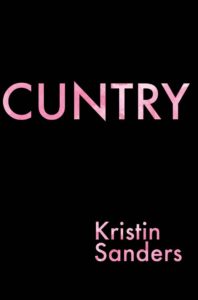
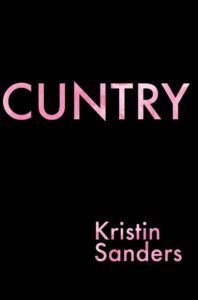
 Kristin Sanders is the author of two poetry chapbooks, Orthorexia (Dancing Girl Press 2011), and This is a map of their watching me, a finalist in the 2015 BOAAT Chapbook Competition. She has taught at Cal Poly, San Luis Obispo; Loyola University, New Orleans; Belmont University; and Louisiana State University. She is currently a poetry editor for the New Orleans Review and a contributing writer at Weird Sister. CUNTRY was a finalist for the 2015 National Poetry Series.
Kristin Sanders is the author of two poetry chapbooks, Orthorexia (Dancing Girl Press 2011), and This is a map of their watching me, a finalist in the 2015 BOAAT Chapbook Competition. She has taught at Cal Poly, San Luis Obispo; Loyola University, New Orleans; Belmont University; and Louisiana State University. She is currently a poetry editor for the New Orleans Review and a contributing writer at Weird Sister. CUNTRY was a finalist for the 2015 National Poetry Series.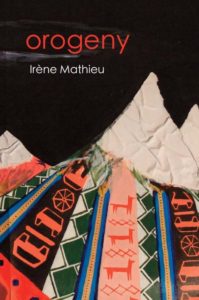
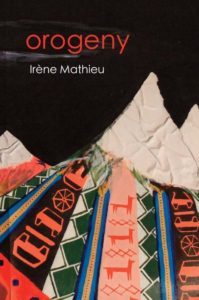 by Irène Mathieu
by Irène Mathieu Irène Mathieu is a pediatrician, writer, and public health researcher who has lived and worked in the United States, the Dominican Republic, Guatemala, Peru, and elsewhere. She has been a Pushcart Prize nominee, a Callaloo fellow, and a Fulbright scholar. Irène is the author of the poetry chapbook the galaxy of origins (dancing girl press, 2014). She holds a BA in International Relations from the College of William & Mary and a MD from Vanderbilt University.
Irène Mathieu is a pediatrician, writer, and public health researcher who has lived and worked in the United States, the Dominican Republic, Guatemala, Peru, and elsewhere. She has been a Pushcart Prize nominee, a Callaloo fellow, and a Fulbright scholar. Irène is the author of the poetry chapbook the galaxy of origins (dancing girl press, 2014). She holds a BA in International Relations from the College of William & Mary and a MD from Vanderbilt University.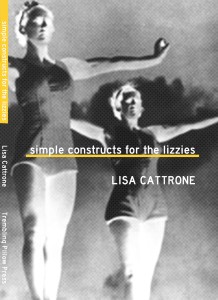
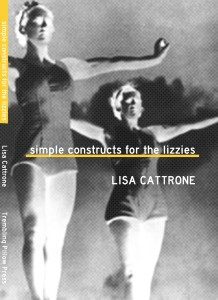 simple constructs for the lizzies
simple constructs for the lizzies Lisa Cattrone is a mother and high school teacher living in California. She received her BA in Philosophy and MFA in poetry from Saint Mary’s College of California. Her poetry and essays have appeared in various journals including The Chicago Review, The Awl, The Volta, Lemon Hound, Gulf Coast, The Claudius App, Denver Quarterly, Volt, Interim, Fourteen Hills and West Wind Review, among many others. Her chapbooks Mutations for Jenny and My Secret Life were both published by Horse Less Press.
Lisa Cattrone is a mother and high school teacher living in California. She received her BA in Philosophy and MFA in poetry from Saint Mary’s College of California. Her poetry and essays have appeared in various journals including The Chicago Review, The Awl, The Volta, Lemon Hound, Gulf Coast, The Claudius App, Denver Quarterly, Volt, Interim, Fourteen Hills and West Wind Review, among many others. Her chapbooks Mutations for Jenny and My Secret Life were both published by Horse Less Press.![[ the door ]](https://www.tremblingpillowpress.com/wp-content/uploads/2018/02/the-door.jpg)
![[ the door ]](https://www.tremblingpillowpress.com/wp-content/uploads/2018/02/the-door-204x300.jpg)
 Jenny Drai’s poetry has appeared in American Letters and Commentary, Denver Quarterly, Handsome, Jellyfish, and New American Writing, among many other journals. She is the author of Letters to Quince (winner of the Deerbird Novella Prize from Artistically Declined Press) and two poetry chapbooks—The New Sorrow Is Less Than the Old Sorrow (Black Lawrence Press) and :Body Wolf: (Horse Less Press). [ the door ] is her first full-length collection of poetry. Two additional collections are forthcoming from Black Lawrence Press. In addition, a novel she wrote was a finalist in the Subito Press Prose Prize. She has worked every odd job imaginable and lived all over the place in the United States and Germany. She currently resides in Bonn, Germany, where she is at work on another novel. You can find her at jennydraiisferal.tumblr.com or follow her on Twitter @jenny_drai.
Jenny Drai’s poetry has appeared in American Letters and Commentary, Denver Quarterly, Handsome, Jellyfish, and New American Writing, among many other journals. She is the author of Letters to Quince (winner of the Deerbird Novella Prize from Artistically Declined Press) and two poetry chapbooks—The New Sorrow Is Less Than the Old Sorrow (Black Lawrence Press) and :Body Wolf: (Horse Less Press). [ the door ] is her first full-length collection of poetry. Two additional collections are forthcoming from Black Lawrence Press. In addition, a novel she wrote was a finalist in the Subito Press Prose Prize. She has worked every odd job imaginable and lived all over the place in the United States and Germany. She currently resides in Bonn, Germany, where she is at work on another novel. You can find her at jennydraiisferal.tumblr.com or follow her on Twitter @jenny_drai.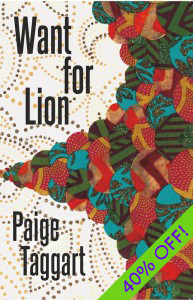
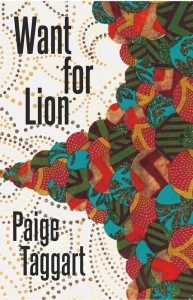 by Paige Taggart
by Paige Taggart Paige Taggart is a Northern Californian and currently resides in Brooklyn. Want For Lion is her first full-length collection. Her second book Or Replica will be published by Brooklyn Arts Press. She is the author of 5 chapbooks: Last Difficult Gardens (Horse Less Press), DIGITAL MACRAMÉ (Poor Claudia) Polaroid Parade (Greying Ghost) and The Ice Poems (DoubleCross Press), and forthcoming I am Writing To You From Another Country; Translations of Henri Michaux (Greying Ghost Press). She earned her MFA from the New School and was a 2009 NYFA fellow. She works as a full-time jewelry production manager & additionally makes her own jewelry at
Paige Taggart is a Northern Californian and currently resides in Brooklyn. Want For Lion is her first full-length collection. Her second book Or Replica will be published by Brooklyn Arts Press. She is the author of 5 chapbooks: Last Difficult Gardens (Horse Less Press), DIGITAL MACRAMÉ (Poor Claudia) Polaroid Parade (Greying Ghost) and The Ice Poems (DoubleCross Press), and forthcoming I am Writing To You From Another Country; Translations of Henri Michaux (Greying Ghost Press). She earned her MFA from the New School and was a 2009 NYFA fellow. She works as a full-time jewelry production manager & additionally makes her own jewelry at 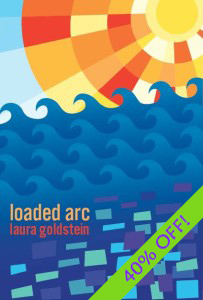
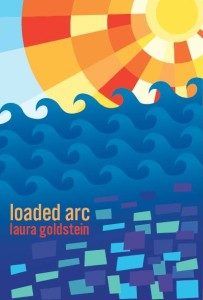 by Laura Goldstein
by Laura Goldstein Laura Goldstein has published six chapbooks as well as poetry and essays in the Denver Quarterly, American Letters and Commentary, MAKE Magazine, How2, Jacket2 and other fine publications.Laura holds degrees from the University of Pennsylvania,Temple University and the School of the Art Institute of Chicago. She teaches Writing and Literature at Loyola University and co-curates the Red Rover Series with Jennifer Karmin. She lives in Chicago with her husband, artist Brett Ian Balogh. loaded arc is her first full-length collection of poetry.
Laura Goldstein has published six chapbooks as well as poetry and essays in the Denver Quarterly, American Letters and Commentary, MAKE Magazine, How2, Jacket2 and other fine publications.Laura holds degrees from the University of Pennsylvania,Temple University and the School of the Art Institute of Chicago. She teaches Writing and Literature at Loyola University and co-curates the Red Rover Series with Jennifer Karmin. She lives in Chicago with her husband, artist Brett Ian Balogh. loaded arc is her first full-length collection of poetry.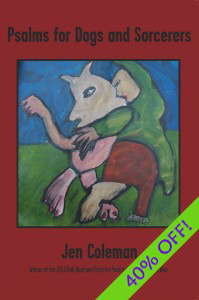
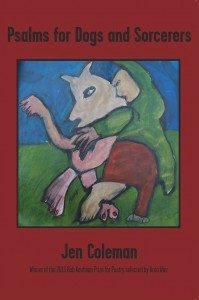 by Jen Coleman
by Jen Coleman Jen Coleman was born in Minnesota in 1970. She earned a BA in Theater from Beloit College, and worked briefly at a circuit board factory, a three ring binder factory, a blanket factory, a gas station, as a theater electrician and as a schoolbus driver. She earned an MFA in poetry from George Mason University. There, she studied with Susan Tichy, Peter Klappert and Carolyn Forché. Her work was further shaped by the Washington, DC, poetry community. While in DC, Jen co-hosted with Allison Cobb a season of the DCAC “In Your Ear” reading series and completed a collaborative chapbook with CE Putnam and Allison Cobb entitled Communal Bebop Canto. Jen and Allison moved to New York in 2000, where they joined Ethan Fugate and Susan Landers in editing six issues of Pom2, “a journal of poetic polylogue.” While in DC and New York, Jen worked for Environmental Defense Fund. Jen and Allison moved to Portland, Oregon in 2008, where they live with their dog, Quincy. In Portland, Jen participated in the 13 Hats collaborative of artists and writers. She co-hosts readings with the Spare Room Collective and works for Oregon Environmental Council. This is her first full-length volume.
Jen Coleman was born in Minnesota in 1970. She earned a BA in Theater from Beloit College, and worked briefly at a circuit board factory, a three ring binder factory, a blanket factory, a gas station, as a theater electrician and as a schoolbus driver. She earned an MFA in poetry from George Mason University. There, she studied with Susan Tichy, Peter Klappert and Carolyn Forché. Her work was further shaped by the Washington, DC, poetry community. While in DC, Jen co-hosted with Allison Cobb a season of the DCAC “In Your Ear” reading series and completed a collaborative chapbook with CE Putnam and Allison Cobb entitled Communal Bebop Canto. Jen and Allison moved to New York in 2000, where they joined Ethan Fugate and Susan Landers in editing six issues of Pom2, “a journal of poetic polylogue.” While in DC and New York, Jen worked for Environmental Defense Fund. Jen and Allison moved to Portland, Oregon in 2008, where they live with their dog, Quincy. In Portland, Jen participated in the 13 Hats collaborative of artists and writers. She co-hosts readings with the Spare Room Collective and works for Oregon Environmental Council. This is her first full-length volume.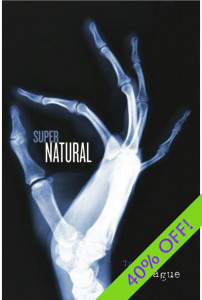
 by Tracey McTague
by Tracey McTague Tracey McTague lives up on Battle Hill in Brooklyn, down the street from where she was born and across the room from where her daughter was born. She is the ornithologist consigliere for Lungfull! Magazine by day. By night, she is a root doctor, alchemist and hunter-gatherer.
Tracey McTague lives up on Battle Hill in Brooklyn, down the street from where she was born and across the room from where her daughter was born. She is the ornithologist consigliere for Lungfull! Magazine by day. By night, she is a root doctor, alchemist and hunter-gatherer.
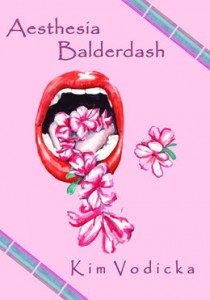
 Kim Vodicka grew up in Lafayette, Louisiana and received her B.A. in English from UL Lafayette in 2010. She is currently working on her M.F.A. in Poetry at LSU, where she is also a Graduate Teaching Assistant and Co-Coordinator of Delta Mouth Literary Festival 2012. Kim is an avid lover of music, hosts a psychedelic rock show, “Shangri-La-La Land,” on KLSU, and is involved in musical-poetic projects. She believes that poems want to be songs very badly, and she can recite most of her work from memory. Her artwork has been published in Tenderloin, and her poems have been published in Shampoo, Ekleksographia, and Dig. Aesthesia Balderdash is her first book.
Kim Vodicka grew up in Lafayette, Louisiana and received her B.A. in English from UL Lafayette in 2010. She is currently working on her M.F.A. in Poetry at LSU, where she is also a Graduate Teaching Assistant and Co-Coordinator of Delta Mouth Literary Festival 2012. Kim is an avid lover of music, hosts a psychedelic rock show, “Shangri-La-La Land,” on KLSU, and is involved in musical-poetic projects. She believes that poems want to be songs very badly, and she can recite most of her work from memory. Her artwork has been published in Tenderloin, and her poems have been published in Shampoo, Ekleksographia, and Dig. Aesthesia Balderdash is her first book.